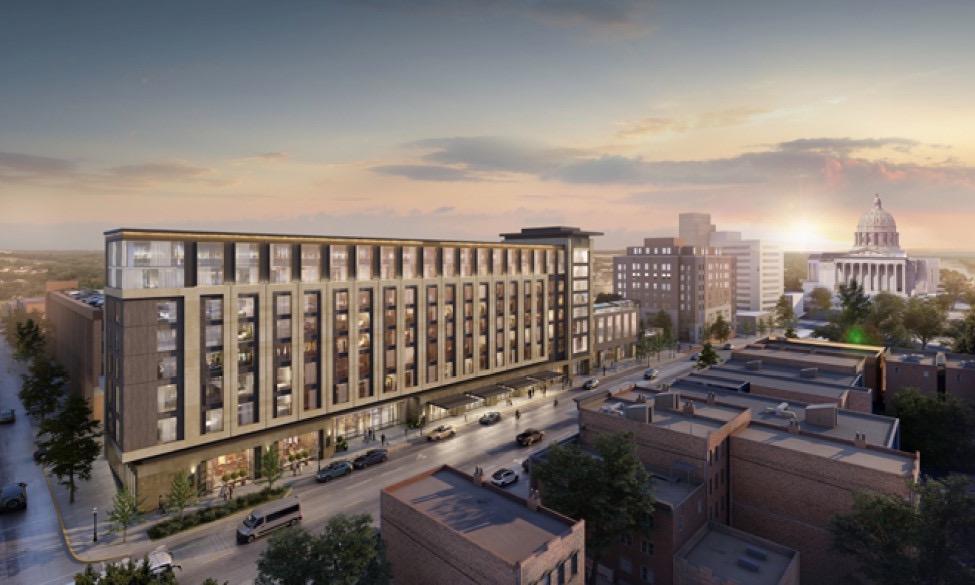Failure of Missouri construction budget bill shocks communities, enrages state Senate

Blast waves from Friday’s explosive decision by Missouri House Republicans to kill a $517 million capital improvements bill echoed through the state Monday, with local officials picking up the shards of shattered plans and state senators furious as they recover from shell shock.
The spending on new construction isn’t essential for the day-to-day operations of state government. But failure to pass the bill means 86 projects developed over many months — or in some cases years — must secure other funding, wait a year for another opportunity for state support or be canceled.
Jefferson City was in the bill for $20 million to help a $130 million project for a conference center, hotel and parking garage come to life. That project, developed in detail in 2023, would be funded mainly by bonds secured by revenue from city lodging taxes and the activity it generates, said Luke Holtschneider, executive director of the Jefferson City Regional Economic Partnership.
The project plans will likely be pared back, he said.
“Obviously it came as a bit of a shock, or very much a shock, on Friday,” Hotschneider said in an interview with The Independent. “So we’re still trying to understand from our standpoint, how we envision the future of this project without that.”
State Rep. David Griffith, a Jefferson City Republican, noted that his community lost other projects as well, including $15 million to preserve the Missouri State Penitentiary structures and $4 million for a juvenile detention center.
But Griffith supports the House’s decision.
“I can tell you that we all lost,” Griffith said. “Everybody on our side of the aisle, everybody in the House, lost projects. We lost projects that were important to all of us.”
When the Senate took up a House bill being handled by state Sen. David Gregory, a Chesterfield Republican, the reverberations began — Senate Appropriations Chairman Lincoln Hough rose to say he did not intend to let any House bills pass.
And, Hough made clear, he had called Gregory to tell him before going to the floor.
“I wanted everyone to understand the openness in which you and I talked about what was getting ready to happen today based on the activities or really, I guess you can see the inactivity of our counterparts on the other side last week,” Hough said.
Hough then spent the next two hours going through the spending measure, line by line, calling colleagues to the floor to discuss projects in their district that would not be funded.
And, he said after Gregory set the bill aside two hours later, he will continue at the next opportunity.
“It’s important to itemize what is lost now, due to just the inaction of the House last week,” Hough said.
Some of the projects not funded include:
- $50 million to support the University of Missouri’s project to build a new research reactor.
- $55 million for a new livestock display and stalling barn at the Missouri State Fairgrounds.
- $40 million for health care projects in amounts ranging from $750,000 to $10 million in St. Louis, Lee’s Summit, Barry County, Springfield, Kansas City, Joplin, Clinton, Butler, Salem, St. Joseph, Pineville, Sullivan County, Scotland County and Pemiscot County.
The result of the House inaction, Hough said, is more precarious access to health care in rural areas, slower action on crime evidence at state laboratories and higher costs for residents in areas where projects go ahead.
In Park Hills, $2.5 million was to defray some costs before the city goes to voters in November for a bond issue for replacement of lead water lines, said Zach Franklin, city administrator. It would help reduce the increase in rates needed to pay for the project, he said.
“It shows we were acting in good faith to say to our users we have saved you this much money to date,” Franklin said.
MU spokesman Christopher Ave said the university would “move forward aggressively with fundraising and planning” despite the setback because of the need for the isotopes.
“The importance of NextGen MURR in producing life-saving radioisotopes cannot be overstated,” Ave said. “These radioisotopes have not only extended the lives of Missourians but hundreds of thousands of others around the globe.”
Under questioning from Hough, state Sen. Stephen Webber, a Columbia Democrat, noted that the MU Research Reactor is one of the few places in the world producing many of the products.
“I would like to think that when it comes to cancer patients, and cancer research, I would say, ‘you know what, maybe I didn’t get everything I wanted, but I’m going to support that,’” Webber said.
The livestock barn, said state Sen. Rusty Black, a Republican from Chillicothe, is the essential adjunct to a new arena under construction at the fairgrounds.
“Why build a football field at the Arctic Circle if you’re not going to put the locker rooms for people to dress in?” Black said. “And that’s what they’ve done with that facility.”
And when Hough called on state Sen. Karla May, a St. Louis Democrat, to give her take on the House inaction, she said she was still simmering in anger. The action, she said, was like a tantrum.
“When you’re raising kids and you’re a parent, you know how your children get upset and they storm out of a room because they haven’t figured out how to handle their emotions maturely?” May said.
The House response should have been to talk and warn the Senate that there was a limit to what it would accept, she said. But when the state has a healthy fund balance and needs to fill, the money should be spent, she said.
“This is taxpayers’ money,” May said. “Taxpayers’ money is supposed to go back to benefit taxpayers.”
The budget process this year was the most routine in several years in large part because factional fights among state Senate Republicans have been quashed. Like nine of the last 10 years, the House and Senate passed budget plans for state operations, then met in conference committees to iron out differences.
The Senate took up three capital spending bills first thing Friday. Along with the bill with money for new projects, there was a $633 million bill for maintenance projects and a $2.7 billion spending bill to continue projects first authorized two years ago.
Meanwhile, the House was passing the negotiated versions of 13 bills spending $49.8 billion to fund the day-to-day operations of state government in the coming fiscal year.
The House recessed after finishing the operating budget, took up a couple of non-spending bills when members returned and then, after the Senate had adjourned for the week, started voting on the construction bills. Only when the House also adjourned was it clear members would not vote on the bill for new projects.
In a news conference Friday, House Budget Committee Chairman Dirk Deaton said the bill was killed because overall spending in the budget had exceeded the amount he set as the ceiling and there had been no time to work out differences.
In Gov. Mike Kehoe’s budget, the bill cost $329.4 million, including $143.8 million in general revenue. When it left the House, it had grown to $401.5 million, with $215.9 million in general revenue. When the Senate approved it, the bill cost $513.1 million and $327.5 million in general revenue.
Unlike the operating budget, in nine of the last 10 years the capital improvements budget passed the Senate too late to arrange a conference committee. In those nine years, the Senate either passed the bill as approved in the House without changes or the House accepted the Senate version in order to meet the constitutional deadline.
The only year a conference committee was appointed, in 2017, no compromise was reached and the bill, which had $63 million in total spending, was not passed.
There was no individual project in the bill for new projects that led to the decision to kill it, said state Rep. Bishop Davidson, a Republican from Republic and vice chairman of the House Budget Committee. Instead, he said, it was the overall cost.
The budget as passed would use $15.8 billion in general revenue. With the bill for new construction, the total would be pushed to $16.1 billion, or about $2.6 billion more than expected revenue. The difference will come from banked surpluses.
Passing the bills as they were revised in the Senate, “would have been definitely on the table this year if it weren’t for the fact that it would have put us in what we saw as a fiscally irresponsible position,” Davidson said.
State Rep. Barry Hovis, a Cape Girardeau Republican, was watching four projects in the construction budget — $750,000 to support a city water project, $7 million for an air traffic control training center for the Southeast Missouri State University aviation program, $12.7 million for a new crime lab for Troop E of the Missouri State Highway Patrol and $20 million to support a redevelopment project in downtown Cape Girardeau.
All four projects were added in the House, with the redevelopment project increased from $11 million to $20 million in the Senate.
There had been hints the Senate additions to the bill might cause problems, Hovis said, but he did not know when he returned to the floor after the recess that no action would be taken.
“I did not know, the day of, that we were not going to bring the bill up for a vote, but we’re still discussing it as a caucus and want to stay unified,” Hovis said.
Kehoe could bring lawmakers back to pass the bill in a special session or lawmakers could decide to do that on their own.
“I hope that we can come up with some sort of a plan or position that would allow us to revisit this,” Hovis said, “because there are still some options that could be considered, like a special session or something along those lines.”
GET THE MORNING HEADLINES.
Missouri Independent is part of States Newsroom, a nonprofit news network supported by grants and a coalition of donors as a 501c(3) public charity. Missouri Independent maintains editorial independence. Contact Editor Jason Hancock for questions: info@missouriindependent.com.
Miss Clipping Out Stories to Save for Later?
Click the Purchase Story button below to order a print of this story. We will print it for you on matte photo paper to keep forever.

